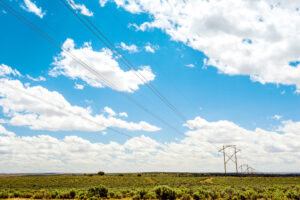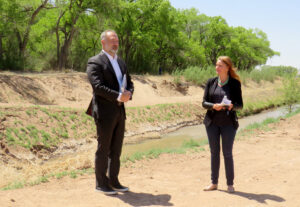Brooklyn Residents File Civil Rights Complaint Seeking to Pause Gas Pipeline

Opponents of a gas pipeline snaking its way through Brooklyn are formally alleging its location, approval and operation discriminate against communities of color along its route, in violation of federal and state environmental and civil rights laws.
Lawyers on behalf of Brownsville Green Justice and the Ocean Hill-Brownsville Coalition of Young Professionals, Mi Casa Resiste and the Indigenous Kinship Collective on Monday filed a petition to the U.S. Department of Justice, Environmental Protection Agency, Department of Energy and Department of Transportation requesting an investigation into the pipeline’s siting and approval.
Meanwhile, they demand, federal authorities should stop the flow of gas, which is extracted through fracking.
It’s the latest effort to halt the project, which has been a focus of contention for over a year.
National Grid’s Metropolitan Reliability Project, also known as the North Brooklyn Pipeline, is slated to run nearly seven miles, from Brownsville to Greenpoint. Four phases between Brownsville and East Williamsburg are complete and operational, but the final section, connecting the pipeline via Williamsburg to National Grid’s Greenpoint storage and production facility, needs further review and approval.
The state Department of Public Service (DPS) and Department of Environmental Conservation (DEC) improperly approved the pipeline, complain the petitioners.
The groups are asking the federal agencies to “step in where they [state agencies] have failed,” said Britney Wilson, a lawyer and director at the New York Law School’s Civil Rights and Disability Justice Clinic, at an event at the Brownsville Playground Monday. She is also a resident of the neighborhood.
The letter alleges National Grid misled the public about the nature of the infrastructure project and did not adequately inform or hear from the communities along the route. Nor did the company pressure-test its pipes or submit the necessary data and maintenance plans prior to the pipeline’s operation, the letter claims.
According to the coalition of opponents, DPS and DEC allegedly abdicated their responsibilities to ensure National Grid followed all necessary regulations, and failed to fully review whether the pipeline disproportionately imposed environmental, health and economic burdens on the communities that live along its route.
“This pipeline was built without our knowledge and consent,” said Celina Trowell, chair of the Ocean Hill-Brownsville Coalition of Young Professionals. “National Grid put this project here because they thought nobody would fight back, and DEC and DPS didn’t check on it at all.”
‘We Would’ve Said “Hell No”’
The letter to the federal agencies states that the pipeline’s siting and operation subjected residents along the route to “health and safety risks and economic harm on the basis of race,” noting that their neighborhoods are mostly Black and Hispanic.
The risks, the letter says, include aggravated respiratory issues — especially for those who already have underlying health problems, explosions as a result of leaks, and contamination to nearby soil and groundwater.
The complaint points out that the DEC in 2018 denied a permit for a nearly eight-mile gas pipeline that would conclude at a power plant in the majority-white upstate town of Wawayanda in part because the related federal review didn’t consider the impacts of both the pipeline and the power plant together.
“The sad reality is this type of environmental racism has been going on for years,” said Trowell. “It’s part of why we already have the worst public health outcomes.”
Since National Grid, DPS and DEC all receive federal funding, they are subject to the federal Civil Rights Act, which bars discrimination and actions that lead to disparate impacts based on race, said Anjana Malhotra, a lawyer at the National Center for Law and Economic Justice.
What’s more, Malhotra added, under federal and state regulations, the agencies and company are “required to consult with minority communities, make sure their voices are heard in any decision making and are also federally required to give notice and consider the impact on communities of color.”
National Grid and the agencies involved maintained the pipeline was sited legally.
“Contrary to the allegations made in this letter, all work on the Metropolitan Reliability Project was fully compliant with all laws, rules and regulations, conducted with the required permits and approvals in place, and was the subject of numerous public hearings and notifications,” said Wendy Ladd, a National Grid spokesperson.
Groups around Brooklyn have been opposing the pipeline for more than a year, consistently saying they never knew about the project until 2020, about three years after construction started. In part, the letter said, that’s because National Grid misrepresented the nature of the pipeline, implying it was small improvements to existing infrastructure, while the state agencies never held requisite public hearings to solicit opinions from neighbors along the route.
National Grid on its website says it conducted outreach to local businesses and residents who lived along the pipeline’s path prior to and during construction. DPS hosted in-person and remote public hearings on National Grid’s pipeline proposal in 2016, and more recently, held hearings on upgrades to the Greenpoint facility — as did DEC, which in March hosted three nights of public hearings on the same topic.
DPS also solicited written comments on the company’s proposal, collecting more than 8,000, according to agency spokesperson James Denn.
Still, many residents of the neighborhood dispute that they were adequately informed of construction plans involving the pipeline specifically.
“We need to make sure that our people are informed and our people have a choice,” said Maritza Henriquez, a Williamsburg resident and member of the Frack Outta BK Coalition. “The Black and brown residents of Brooklyn, had we known about what was happening in our communities, we would’ve said ‘Hell no’ to the fracked gas pipeline.”
A $4.89 Bill Hike
The Public Service Commission earlier this month approved a rate hike for National Grid customers in New York City and Long Island, in part to pay for the pipeline and other infrastructure upgrades designed to meet growing energy needs and increase reliability. Customers will initially see a jump of an average of $4.89 per month on their gas bills.
DPS determined the projects did not disproportionately burden disadvantaged communities — “contrary to the claims of certain opponents,” agency Administrative Law Judge James Costello said at the time — nor did it run afoul of a state climate law that mandates emissions cuts.
In an email, Denn underscored the DPS’ commitment to “environmental justice, promoting community equity, and minimizing community siting impacts to the fullest extent possible.”
“All permitting entities, including New York City, determined the pipeline project complied with all applicable laws and regulations,” he added.
The letter to the feds also targets the state Department of Environmental Conservation, asserting the agency wrongly didn’t oppose the construction of the pipeline.
The groups also contend that the DEC’s finding that National Grid’s infrastructure upgrades wouldn’t pose a significant environmental impact to the nearby community is flawed, because the environmental agency only considered upgrades the company would make to its facility in Greenpoint, separate from the pipeline routed through the neighborhoods to its south.
A spokesperson for the state Department of Environmental Protection, Jeff Wernick, disputed those claims.
“DEC subjects all applications for environmental permits to a transparent and rigorous review process that encourages public input at every step and includes review of all public comments,” said Wernick. “DEC also carefully reviews all applicable federal and state standards to ensure the agency’s decision is protective of public health and the environment, upholds environmental justice and fairness, and meets the applicable standards.”
This article was originally posted on Brooklyn Residents File Civil Rights Complaint Seeking to Pause Gas Pipeline







